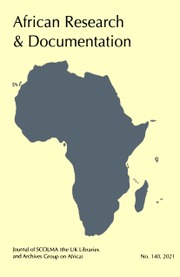Article contents
African Studies in Portugal & the Lusophone World
Published online by Cambridge University Press: 25 April 2022
Extract
The word “Luso” comes from an old constellation of Iberian-Celtic tribes established in the mountainous areas of today's Portugal and Spain. They were a warlike people who offered fierce resistance to the Roman conquest. However, once the territory was conquered, the romanisation was so intense that, apart from one or two words, little remained of the previous cultural legacy. One cannot even affirm that this ancestral people, the Lusitans, were the main basis of today's Portuguese population. We can, however, see the undeniable importance of these tribes from their numerous archaeological remains. However, as Jorge Dias, an eminent Portuguese anthropologist notes: “the country was destined to be a meeting point of many races, coming from the Mediterranean, like the Phoenicians, who secured the ports, and others from the extreme north, like the Normans who invaded its coasts”.
- Type
- Articles
- Information
- Copyright
- Copyright © International African Institute 2002
References
- 1
- Cited by




